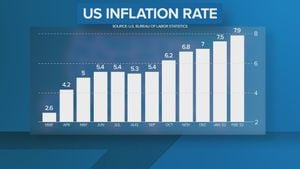Gary Lineker, the beloved face of BBC's Match of the Day, has announced his decision to step down as the program's host, concluding what has been described as one of the most celebrated tenures in sports broadcasting. After more than 25 years of bringing football highlights to fans across the nation, Lineker's departure from Match of the Day marks not just the end of this era, but also invites discussions about the future of this iconic show.
Lineker, who has held the hosting position since 1999, explained his rationale, stating, "It has been an absolute joy and privilege to present such an iconic show for the BBC, but all things have to come to an end." This sentiment closely follows the completion of the current football season, as he emphasizes the need for fresh leadership amid changes at the BBC.
Reflecting on his time, Lineker remarked, "I bowed out in my football career when I felt it was the right time. I feel this is now the right time." His comments highlight not just personal sentiment but also the broadcaster's intent to invigorate the program as it prepares to enter a new contract phase. Looking forward, he suggested, “I think the next contract they’re looking to do Match of the Day slightly differently, so I think it makes sense for someone else to take the helm.”
Known for his sharp wit and extensive football knowledge, Lineker has hosted Match of the Day through numerous changes within the sport and the broadcasting world. Under his stewardship, the show became synonymous with Saturday night football for viewers across the UK, maintaining consistently high viewing figures and popularity.
While announcing his exit from Match of the Day, Lineker will not be leaving the BBC altogether. He confirmed he will continue to host coverage of major sporting events, such as the upcoming FA Cup and the World Cup. This was paired with the announcement of his plans to remain active with BBC programming, including his podcast, The Rest Is Football, where he engages with audiences on various topics related to soccer.
The position of Match of the Day host is now up for debate, and several names are circulating as potential replacements, including Mark Chapman, who currently presents Match of the Day 2, and Alex Scott, who has gained respect for her roles within sports broadcasting. Lineker acknowledged the significance of this transition, saying, “It’s the flagship BBC Sports programme, hopefully, it always will be.”
While he will step aside, the former England striker indicated he is reassured about leaving the show “in really good shape,” crediting the supportive audience and the incredible team behind the production. Lineker has been the BBC's highest-paid presenter for several years, reportedly earning about £1.35 million during the 2023-24 period, and he is aware of the responsibility this title brings.
Lineker's decision to leave coincides with broader discussions around the BBC's policy on presenters expressing political opinions. His previous suspension from the show, stemming from his outspoken comments on immigration policy, drew significant media attention and public debate about the broadcaster's stance on impartiality. Nevertheless, he regained his position within days after immense support from colleagues and fans, underlining his prominent status within the organization.
The shift away from Lineker as the host of Match of the Day is viewed by many as monumental. It's not just about losing one of the most recognizable faces of sports broadcasting; it also signifies the potential for new voices and styles to define how football is presented on British television. This transition period might herald innovation amid traditional programming.
Despite rumors circling around possible successors, Lineker emphasized the importance of authenticity for whoever takes over his role. He stated, “I would never tell publicly my preference... whoever it is, I would say be yourself.” With his legacy firmly planted within the fabric of the BBC, he expressed confidence the show would continue to thrive and adapt going forward.
Lineker also took time to reflect on the tremendous reception he received upon news of his impending exit, describing the supportive reactions as “a bit bonkers.” He noted, “I didn’t think it would be quite the big deal. It’s just a guy who has done a TV show for so long, and it’s nothing more than,” showcasing his humble approach to fame and his well-deserved reputation.
With this change, both fans and the BBC are left to ponder: what does the future of Match of the Day look like without its iconic host? The uncertainty brings excitement and speculation, with hopes for fresh takes on the program Lineker so passionately helped define. His exit might be seen not simply as retiring from broadcasting but as paving the way for the next generation of football pundits and presenters.
Gary Lineker's narrative from prolific football striker to sports personality and cultural icon highlights the versatile nature of careers within sports media. While he may be stepping down from hosting Match of the Day, his voice and insights will continue to resonate through various platforms, ensuring he remains influential within the sports community. Lineker’s unique ability to connect the sport with viewers has set him apart, and even as he takes this next step, the affection and respect from fans and peers alike will undoubtedly follow him as he continues his engagement with football.
So, as Lineker prepares to leave, one thing remains clear: his legacy will outlast his tenure on Match of the Day, inspiring future hosts and shaping how football is presented on British television for years to come.



